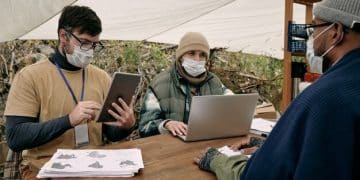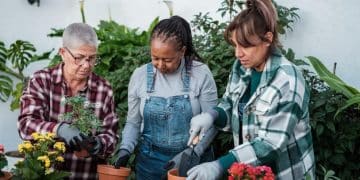Key Steps to Launching a Successful Community Skill-Sharing Workshop

Launching a community skill-sharing workshop involves identifying community needs, securing a suitable venue, recruiting skilled instructors, marketing the workshop effectively, and ensuring ongoing feedback and improvements for future sessions.
Have you ever thought about sharing your skills with your community or learning something new from your neighbors? Launching a community skill-sharing workshop is a fantastic way to connect people, foster learning, and build a stronger, more resilient community. But what are the key steps involved? Let’s explore how you can bring this enriching experience to your local area.
Identifying Community Needs and Interests
Before diving into the logistics of organizing a workshop, it’s crucial to understand what skills your community members are eager to learn or willing to share. This initial step ensures that your workshop will be relevant, engaging, and well-attended.
Conducting Surveys and Polls
One effective method is to conduct surveys and polls within your community. You can distribute these online through social media groups, email lists, or local community websites. Alternatively, you can use traditional paper surveys at community centers, libraries, or local businesses. Ask specific questions about skills people want to learn, skills they are willing to teach, and preferred workshop formats.
Hosting Focus Groups
Another approach is to host focus groups. Gather small groups of residents to discuss their interests and needs related to skill-sharing. This interactive method allows you to delve deeper into the reasons behind their interests and uncover unmet needs that surveys might miss. Make sure to include diverse voices from different age groups, backgrounds, and skill levels.

- Analyze survey results and focus group feedback to identify the most popular and feasible workshop topics.
- Prioritize skills that are in high demand and align with available resources and instructors.
- Consider niche skills that cater to specific interests or address local challenges.
- Evaluate the potential for long-term engagement and ongoing workshops in identified areas.
By thoroughly researching community needs and interests, you can ensure that your skill-sharing workshop meets a genuine demand and fosters a positive learning environment. This groundwork is essential for its success and sustainability.
Securing a Suitable Venue
The venue is a critical component of your workshop’s success. It should be accessible, comfortable, and equipped to support the activities you plan to offer. Choosing the right location can significantly impact participant engagement and overall satisfaction.
Evaluating Accessibility and Location
Consider the accessibility of the venue. Is it easily reachable by public transportation, or does it have ample parking space? Ensure that the location is convenient for the majority of your target audience. Additionally, evaluate if the venue is compliant with accessibility standards, providing ramps, elevators, and accessible restrooms for individuals with disabilities.
Considering Practical Requirements
Practical considerations are equally important. Does the venue have enough space to comfortably accommodate the expected number of participants? Are there tables, chairs, and necessary equipment like projectors, screens, or specialized tools for certain skills? Check the availability of power outlets, lighting, and ventilation to ensure a comfortable learning environment.
- Explore local community centers, libraries, schools, and churches as potential workshop venues.
- Negotiate rental fees or seek in-kind donations for venue use.
- Ensure the venue is insured and meets safety standards.
- Create a welcoming and inclusive atmosphere at the venue.
Selecting a venue that meets both logistical and practical requirements is crucial for creating a positive and productive workshop experience. A well-chosen venue contributes significantly to participant engagement and the overall success of your skill-sharing initiative.
Recruiting Skilled and Passionate Instructors
The quality of your instructors directly influences the value and appeal of your skill-sharing workshop. Recruiting individuals who are not only skilled in their craft but also passionate about teaching is essential for creating an engaging and effective learning environment.
Identifying Potential Instructors
Start by tapping into your community network. Reach out to local artisans, hobbyists, professionals, and retired experts who might be willing to share their knowledge. Use social media, community boards, and word-of-mouth to spread the word about your need for instructors. Look for individuals with a proven track record of skill and a genuine enthusiasm for teaching.

Providing Support and Resources
Offer instructors support and resources to help them prepare and deliver their workshops effectively. This might include providing templates for lesson plans, access to teaching materials, or training sessions on effective teaching techniques. Acknowledge their contribution with certificates of appreciation, small stipends, or opportunities for professional development.
- Conduct interviews or auditions to assess instructors’ skills and teaching style.
- Provide clear expectations and guidelines for workshop content and delivery.
- Offer training and resources to help instructors enhance their teaching skills.
- Recognize and appreciate instructors’ contributions to the community.
Recruiting skilled and passionate instructors is paramount for delivering high-quality skill-sharing workshops. By investing in their success, you contribute to a positive learning experience for participants and strengthen the overall impact of your initiative.
Marketing the Workshop Effectively
Effective marketing is crucial for attracting participants and ensuring your skill-sharing workshop reaches its target audience. A well-executed marketing strategy creates awareness, generates interest, and motivates people to sign up.
Utilizing Online Platforms
Leverage online platforms to promote your workshop. Create engaging social media posts on Facebook, Instagram, and Twitter, highlighting the benefits of participating and showcasing the skills being taught. Use relevant hashtags to reach a wider audience and consider running targeted ads to reach specific demographics. Develop a simple website or landing page with detailed information about the workshop, including dates, times, location, instructors, and registration details.
Collaborating with Community Partners
Forge partnerships with local community organizations, businesses, and media outlets. Ask them to share information about your workshop through their newsletters, websites, and social media channels. Consider offering joint promotions or cross-marketing opportunities to maximize your reach and visibility. Collaborate with local newspapers or radio stations to feature your workshop in community event listings.
- Create eye-catching flyers and posters for distribution in community spaces.
- Send out email newsletters to your mailing list with workshop updates and registration information.
- Offer early bird discounts or referral bonuses to incentivize sign-ups.
- Host a launch event or information session to generate excitement and answer questions.
By implementing a comprehensive marketing strategy, you can maximize the reach of your skill-sharing workshop and attract a diverse group of participants. Consistent and targeted marketing efforts will ensure that your event is well-attended and generates a buzz within the community.
Providing a Positive and Inclusive Learning Environment
Creating a positive and inclusive learning environment is critical for ensuring that all participants feel welcome, respected, and supported. A conducive atmosphere fosters engagement, encourages participation, and maximizes the learning experience for everyone involved.
Promoting Respect and Open Communication
Establish clear guidelines for respectful and open communication from the outset. Encourage participants to listen actively, share their ideas respectfully, and provide constructive feedback. Foster a culture of empathy and understanding, where individuals feel comfortable expressing themselves without fear of judgment or criticism. Address any instances of disrespectful behavior promptly and fairly.
Offering Adaptations and Accommodations
Be prepared to offer adaptations and accommodations to meet the diverse needs of your participants. This might include providing materials in different formats, adjusting the pace of instruction, or offering alternative activities for individuals with disabilities or learning differences. Create a welcoming and inclusive space where everyone feels supported and has the opportunity to succeed.
- Use inclusive language and avoid jargon or technical terms that might alienate some participants.
- Encourage collaboration and peer support among participants.
- Create opportunities for social interaction and informal learning.
- Celebrate diversity and recognize the unique contributions of each participant.
By prioritizing inclusivity and creating a supportive learning environment, you can ensure that your skill-sharing workshop is a positive and enriching experience for all. This fosters a sense of community and encourages participants to continue learning and sharing their skills.
Collecting Feedback and Making Improvements
Collecting feedback and making continuous improvements is essential for ensuring the long-term success and relevance of your skill-sharing workshop. Gathering insights from participants and instructors allows you to identify areas for improvement and adapt your program to meet evolving community needs.
Gathering Feedback
Implement a system for collecting feedback after each workshop session. This might include distributing anonymous feedback forms, conducting brief online surveys, or facilitating group discussions. Ask specific questions about the workshop content, instruction, venue, and overall experience. Encourage participants to provide both positive and constructive feedback.
Implementing Changes
Analyze the feedback you receive and identify recurring themes and areas for improvement. Prioritize changes that will have the greatest impact on participant satisfaction and learning outcomes. Communicate your plans for improvement to participants and instructors, demonstrating that their feedback is valued and acted upon. Implement changes gradually and monitor their effectiveness over time.
- Track attendance rates and participant demographics to assess the reach of your workshop.
- Solicit feedback from instructors on their experiences and identify ways to support them better.
- Stay informed about best practices in skill-sharing and community engagement.
- Regularly evaluate the alignment of your workshop with community needs and interests.
By embracing a culture of continuous improvement, you can ensure that your skill-sharing workshop remains relevant, engaging, and impactful. This iterative process helps you refine your program, meet evolving community needs, and create a thriving learning environment.
| Key Aspect | Brief Description |
|---|---|
| 🎯Community Needs | Identify skills the community wants to learn or share. |
| 🏢Venue Selection | Secure an accessible and suitable location for workshops. |
| 👩🏫Instructors | Recruit skilled and passionate teachers from the community. |
| 📣Marketing | Promote workshops effectively to attract participants. |
Frequently Asked Questions (FAQ)
▼
Community skill-sharing workshops foster social connections, empower individuals with new skills, and contribute to a more resilient and resourceful community.
▼
Employ surveys, polls, and focus groups to gather insights into the skills residents want to learn or are willing to teach, ensuring relevance and engagement.
▼
Opt for accessible community centers, libraries, or schools that offer adequate space, equipment, and a welcoming atmosphere for all participants.
▼
Reach out to local artisans, professionals, and hobbyists who are passionate about sharing their knowledge, and provide support and resources for their teaching.
▼
Collecting and acting on feedback is crucial for continuous improvement, ensuring the workshop remains relevant, engaging, and aligned with community needs.
Conclusion
Launching a community skill-sharing workshop is a rewarding endeavor that can strengthen community bonds and promote lifelong learning. By following these key steps – identifying community needs, securing a suitable venue, recruiting skilled instructors, marketing effectively, fostering inclusivity, and continuously improving – you can create a successful workshop that enriches the lives of your community members.





